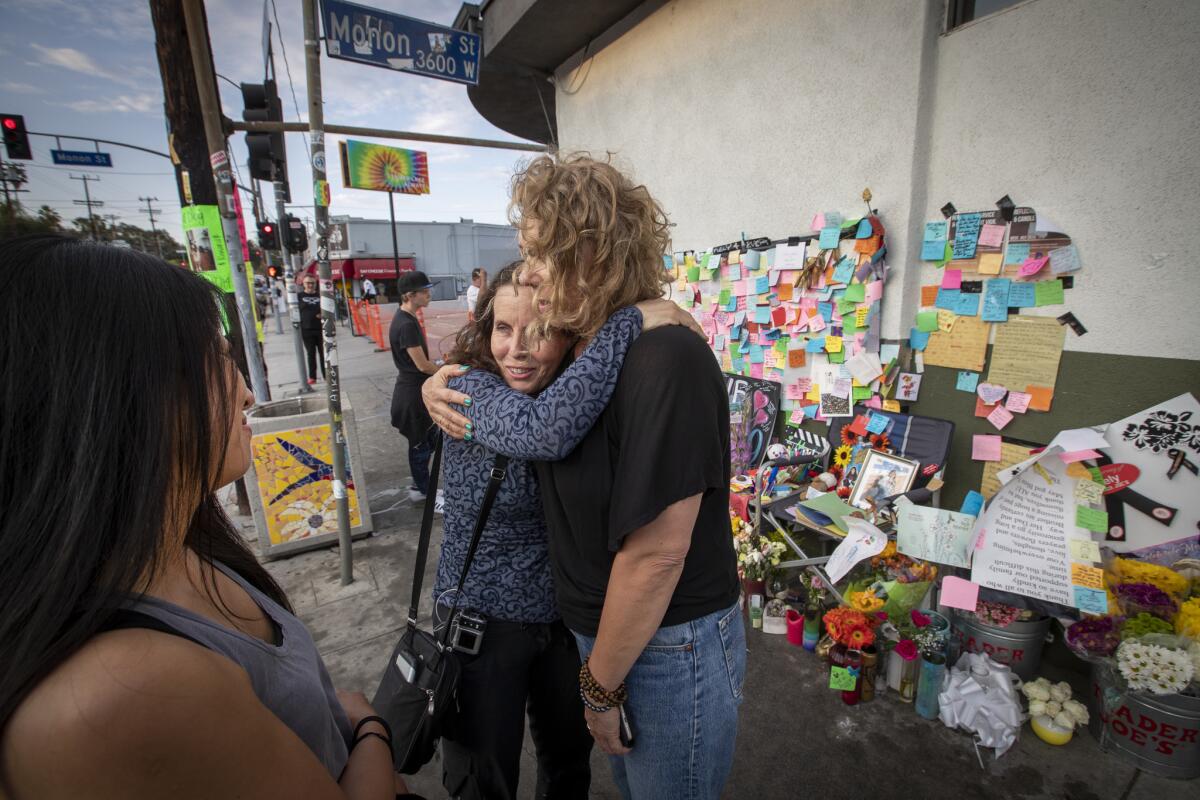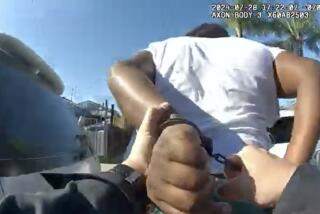Must Reads: The tender, terrifying truth about what happened inside the Trader Joe’s hostage siege

About halfway through the three-hour siege at Trader Joe’s in Silver Lake, the wounded gunman, Gene Atkins, looked at one of his hostages, MaryLinda Moss, and told her it was all over for him. “I just shot at a cop,” he said.
Moss, a 55-year-old artist who exudes calm, feared a suicidal gunman could spark a bloodbath. Through a series of disastrous decisions by Atkins, dozens of strangers had ended up at the grocery store on a hot Saturday afternoon, drenched in fear and surrounded by SWAT teams, helicopters, squad cars and ambulances.
She put her hand on his heart.
“I told him: ‘There’s always hope. I know you have a good heart, and I know you don’t want to hurt anybody.’”
Atkins, 28, protested: “You don’t know what I’ve done.”
Earlier that day, prosecutors say, he had wounded his grandmother during a family fight in South Los Angeles, then forced his girlfriend into a car and fled. Hours later, he led police on a chase, which ended when he crashed outside Trader Joe’s.
“When you put your hand on somebody’s heart,” Moss told me 10 days later, sitting on the stoop of her home in Mount Washington, “it grounds them. I was trying to ground him, and manipulate him, yes, in the best way.”
On July 22, the day after the standoff, she sat down with a voice recorder and recounted, while it was still fresh, everything she could remember about the trauma. It was days before she felt emotionally ready to share her story publicly. When she was, she gave me her recordings, and we talked in person for three hours. The quotes from Atkins and others are based on her recollections.
Video released by police shows the beginning of the incident: Atkins fleeing, crashing into a light pole, shooting at police and then running into the store amid gunfire. He was wounded in his left arm by officers as shoppers and store workers hit the ground. It was about 3:20 p.m.
When the bullets stopped flying, Atkins was trapped inside the store, standing near a checkout counter. Unbeknownst to Atkins and others in the store, 21 people had barricaded themselves in the stockroom.
Moss watched his blood drip onto the tiles. She thinks he asked for her help, so she got up, removed her insulin pump from her hip and took off a long shirt she wore over a tank top. She used her shirt to wrap his arm.
Another shopper, Mike D’Angelo, who would be at Moss’ side for the entire ordeal, suggested Atkins’ belt as a tourniquet. Atkins, who kept a firm grip on his gun, let them.
He began shivering and asked for a jacket. Moss saw some Trader Joe’s sweatshirts near the front of the store. When she walked over to grab them, she discovered Melyda Corado, the 27-year-old store manager lying face down in a pool of blood.
“There’s a woman who’s been shot and she probably needs help,” Moss told Atkins. “And he said: ‘That’s not my fault. That was the police.’” (Atkins has been charged with 31 felonies, including murder.)
D’Angelo and another man struggled to get her body to the door.
Atkins, still in pain, asked for the tourniquet to be removed. D’Angelo used his own shirt as a bandage.
::
Early on, a father of two said he had left his young children in the car. Atkins took the man’s cellphone and let him go. This was the phone the police called.
Somehow, perhaps because she was so calm, perhaps because she had an instinctive understanding of how to keep a desperate gunman calm, Moss put herself in the position of mediating between the cops and Atkins.
An LAPD officer who identified himself only as Sgt. Ruiz urged Atkins to release the hostages. Moss could feel Ruiz going too fast and, because of cellphone lag, talking over Atkins, which agitated him. At such times, she interceded: “I would say: ‘Stop. We’re taking a few minutes. I am hanging up the phone. Everyone is OK.’”
Over and over, she would slow things down, connect with the gunman, make him feel heard and silently communicate to the other hostages with a raised brow, a nod or a hand signal.
Moss sensed Atkins was trying to end the crisis without getting killed by police.
Her constant thought: How do we keep the man with the gun calm?
There did not appear to be a way to disarm Atkins, who kept saying he didn’t want anyone else to get hurt.
“He wasn’t weak enough that we could easily take him down,” Moss said. “Anyway, I was glad we didn’t have to go there.”
About halfway through, SWAT officer Tom Chinappi took over for Ruiz. He was calm, he listened, he used his first name.
Atkins demanded a phone call with his girlfriend, who was in his car when he crashed. That was his condition for surrender.
The girlfriend, police said, was at County/USC, where she was being prepped for surgery. Getting her on the phone would be difficult.
Atkins was unnerved. He thought the cops weren’t really trying to get her.
Suddenly, Atkins looked outside and saw a black-clad sharpshooter on the roof of the cheese shop across the parking lot. Everyone tensed.
If someone started shooting, Moss reasoned, many bad things could happen. Someone was already dead. Moss stood up and physically blocked Atkins. She was in the SWAT officer’s sights. He swiveled his gun a few degrees away.
“Everyone is now absolutely terrified,” Moss said. “Gene is yelling, and he’s saying, ‘If you don’t get that guy off the roof, somebody’s going to get hurt and it’s going to be your fault just like it was with that other woman!’”
Then he started counting down: “Five, four, three….”
Moss screamed and gestured at the sharpshooter : “Get off the roof! Get off the roof!”
An arm appeared, then a head. It was a second SWAT officer on the roof, beckoning the shooter to retreat.
“It was horrifying,” Moss said, “the scariest moment of the day.”
A feeling of being in a dangerous limbo set in.
“You promised to get his girlfriend on the phone,” Moss told Chinappi. “You need to get her on the phone! We need you to fulfill that promise.”
A big, black SWAT truck pulled up to the store’s front door.
“What is that truck doing out there?” yelled Atkins. “Back it up!” The truck rolled back about a foot.
Again, Atkins told Chinappi he would turn himself in after he talked to his girlfriend. Then, to Moss’ astonishment, Atkins asked for handcuffs.
“I looked at him, and everybody, and said: ‘That’s so brilliant! Oh my God, yes, we have a plan now! Handcuffs mean he can put the gun down, and we can go out.’”
::
Moss is a sculptor, installation artist and art consultant. Her husband, Richard Wharton, is an actor. They have two children,14-year-old Ellis, who was waiting in the parking lot when the drama went down, and Tyler, 18. While Moss was in Trader Joe’s, her family gathered across the street.
During the standoff, she and Wharton had a short text exchange.
“Does the shooter know where u are?” he asked.
“It’s ok,” she replied. “I can’t text anymore. We are negotiating.”
Moss has undergone years of trauma therapy and healing work. She is thoughtful, and very tuned-in to other people, which is often described as being “present.” During the siege, she understood instinctively that she had to work at almost cross purposes with the police in order to keep everyone safe. She does not second-guess what the police did; she is thankful they shot and wounded Atkins. If they hadn’t, things could have turned out much worse inside the store.
After she walked out of Trader Joe’s, she decided she would process the experience her own way. She did something nice for herself every day. She visited an energy healer. She had a session with her therapist. She got ice cream with her family. She attended a candlelight vigil in Silver Lake, and Corado’s memorial service at Forest Lawn.
Four days after the siege, she met with a group of fellow hostages for dinner and conversation with a trauma specialist.
She does not want to be singled out for praise.
“It’s a kind of microcosm of what is possible when we are present,” she said, “even in a circumstance where our life might be threatened.”
::
Near the end, four people were left in the store with the gunman. Moss, D’Angelo and two Trader Joe’s employees, Victor and Josie. (Trader Joe’s would not provide their last names.)
Victor unlocked the door so D’Angelo could get the handcuffs. Police urged D’Angelo to come outside, to save himself. He refused. D’Angelo and Moss had worked hard to build Atkins’ trust; he did not want to betray it.
Moss insisted the handcuffs be thrown into the store: “I was using my full, fierce voice. ‘This is the way it has to happen!’ I was screaming.”
The metal bracelets landed inside with a thud.
On the phone, Chinappi said he might be able to get a recording of the girlfriend.
“If you can get a recording,” Atkins said, “you can get a phone call.”
Just get the recording, Moss told Chinappi. “If we can’t get her on the phone,” she said, “at least we’ll have that.”
She asked Atkins his girlfriend’s name, and repeated something she had already told him: She knew people who had made rich, full lives for themselves in prison.
He told her he’d wished he’d met her sooner. “I just needed someone to talk to,” he told her. She told him she would find him in prison to talk. He gave her his name and birth date.
“I do mean it,” she told me. “That doesn’t mean that he’s my ‘project’ or he’s my friend, but I was willing to be present with him that day and I would do that again.”
Atkins’ girlfriend sounded groggy on the recording, but he heard her clearly: “I’m OK, go out.” She said it three times.
After that, Atkins, Moss and D’Angelo started planning how to get the handcuffs on so everyone could get out alive.
“He was working on how to go out voluntarily and it felt to me it was really important to honor that,” Moss said. “If it would save all of us to kill him at that moment, then that was a fine thing to happen, perhaps. But I felt like this was the safest thing to do.”
Atkins wanted to walk to the front of the store, lie down and be cuffed. To Moss, the idea of him walking in full view of the police, holding his gun, was an invitation to disaster.
Moss took Atkins’ face in her hands. She looked into his eyes and, “Your plan scares the shit out of me.” And then, “Do you trust me?”
Without thinking, she took control: They would cuff him where they were, between two cash register counters, put the gun in a grocery bag and walk out together.
“She’s right,” Chinappi said on the phone speaker. “That’s the best way.”
They tried to handcuff him with his hands behind his back, but it was too painful. So they put the cuffs on in front.
Moss, D’Angelo, Victor and Josie formed a circle around Atkins.
“Victor unlocked the door,” Moss said. “And we all went out together.”
Twitter: @AbcarianLAT
More to Read
Sign up for Essential California
The most important California stories and recommendations in your inbox every morning.
You may occasionally receive promotional content from the Los Angeles Times.











